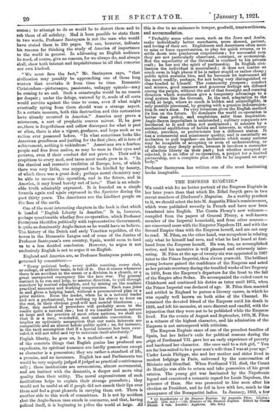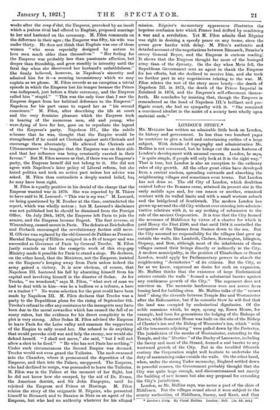THE EMPRESS EUGlaTLE..*
Wa could wish for no better portrait of the Empress Eugenie in her later years than that which Dr. Ethel Smyth gave in two recent numbers of Blackwood's Magazine. As a worthy pendant to it, we should select the late M. Augustin Filon's reminiscences, which were published recently in. French and have now been translated into English. The Comte Fleury's new volumes— compiled from the papers of General Fleury, a well-known member of the Imperial household, and from other sources— are concerned more with the Emperor Napoleon III. and with the Second Empire than with the Empress herself, and are not easy to read. M. Filon, on. the other hand, was scrupuloug in relating only what he himself had seen, and what he had heard at first- hand from the Empress herself. He was, too, an accomplished writer, and his narrative is well planned and extremely inter- esting. M. Filon at the age of twenty-six was appointed in 1867 tutor to the Prince Imperial, then eleven years old. The brilliant young lecturer gained the confidence of the Empress and acted as her private secretary during the troubled weeks of her Regency in 1870, from the Emperor's departure for the front to the fall of the Empire after Sedan. He accompanied the exiled court to Chislehurst and continued his duties as tutor until 1875, when the Prince Imperial was declared of age. M. Filon then married and settled in England to pursue a literary career, in which he was equally well known on both sides of the Channel. He remained the devoted friend of the Empress until his death in 1916, and left his memoirs, at once discreet and candid, with the injunction that they were not to be published while the Empress lived. For the events of August and September, 1870, M. Filon is a witness of the highest character, and his admiration of the Empress is not untempered with criticism.
The Empress Eugenie came of one of the proudest families of Spain, but her father's exile for political reasons during the reign of Ferdinand VII. gave her an early experience of poverty and hardened her character. She once said to a rich girl, " You are far less suited to be a poor man's wife than I was at your age." Under Louis Philippe, she and her mother and sister lived in modest lodgings in Paris, enlivened by the conversation of Merimee and Stendhal. When Ferdinand VII. died, the Count de Montijo was able to return and take possession of his great estates. The young girl was fascinated by the Napoleonic legend and conceived a romantic regard for Louis Napoleon, the prisoner of Ham. She was presented to him soon after his election as President, and he fell in love with her, much to the annoyance of the Bonapartist ladies. In January, 1852, a few • (1) Recollections of the Empress Euginie. By Augustin Filen. L6ndon : Cassell. [21s. net.]—(2) Memoirs of the Empress Eugernie. Edited by Comte Fleury. 2 vols. London : Appleton. 35s. new weeks after the coup (Petal, the Emperor, provoked by an insult which a jealous rival had offered to Eugenie, proposed marriage to her and hastened on the ceremony. M. Filon comments on the difference in their ages ; the Emperor was fifty, his wife was under thirty. He does not think that Eugenie was one of those women " who seem especially designed _ by nature to love men much older than themselves." " Her feeling for the Emperor was probably less than passionate affection, but deeper than friendship, and grew steadily in intensity until the fatal day when she discovered her husband's unfaithfulness." She firmly believed, however, in Napoleon's sincerity and admired him for it—a seeming inconsistency which we may explain as we please. M. Filon records as an exception a trivial episode in which the Emperor lost his temper because the Prince was indisposed, just before a State ceremony, and the Empress called him " stupid." " This was the only time that I saw the Empress depart from her habitual deference to the Emperor." Napoleon for his part came to regard her as " his second conscience." M. Filon, after describing the life at court and the very feminine pleasure which the Empress took in hearing of the numerous men, old and young, who - were dying of love for her, goes on to repudiate the legend of the Empress's party. Napoleon III., like the subtle schemer that he was, thought that the Empire would be strengthened if he could set Clericals against anti-Clericals and encourage them alternately. He allowed the Clericals and Ultramontanes " to imagine that the Empress was on their side and that her influence was being constantly exerted in their favour." But M. Filen assures us that, if there was an Empress's party, the Empress herself did not belong to it. She did not agree with Napoleon's later policy of Liberal reform, but she hated politics and took no active part unless her advice was asked. M. Filon thus contradicts a deeply seated belief, but he may have been right.
M. Filon is equally positive in his denial of the charge that the Empress wanted war in 1870. She was reported by M. Thiers to have said to M. Lesourd : " This war is my war." M. Lesourd, on being questioned by M. Rouher at the time, contradicted the report, which was wholly untrue ; but M. Lesourd's disclaimer was not published lest he should be dismissed from the Foreign Office. On July 28th, 1870, the Emperor left Paris to join the armies, and the Empress became Regent. The first reverse, at Wissemburg, caused unrest in Paris. The defeats at Reichshoffen and Forbach encouraged the revolutionary faction still more. M. Offivier was replaced by the old General de Palikao as Premier.. Marshal Baraguay d'Hilliers resigned in a fit of temper and was succeeded as Governor of Paris by General Trochu. M. Filen justly reminds us that the energetic work of this stop-gap Ministry made it possible for Paris to stand a siege. He declares, on the other hand, that the Ministers, not the Empress, insisted on the Emperor's keeping away from Paris unless indeed the army gained a victory. It is now obvious, of course, that Napoleon III. hastened his fall by absenting himself from his capital and involving himself in the disaster of Sedan. As for Trochu, " we wondered," says M. Filon, " what sort of man we had to deal with in him—was he a buffoon or a tribune, a hero or a traitor ? " No worse selection for the post could have been made by Napoleon III. M. Film declares that Trochu was a party to the Republican plans for the rising of September 4th. Trochu's refusal to offer any resistance to the insurgents may have been due to the moral cowardice which has caused the fall of so many rulers, but the evidence for his direct complicity in the plot is very strong. After Sedan M. Filon advised the Empress to leave Paris for the Loire valley and summon the supporters of the Empire to rally round her. She refused to do anything
that would provoke civil war and help the enemy, nor would she defend herself. " I shall not move," she said, " but I will not allow a shot to be fired." " He who has not Paris has nothing."
Under such circumstances the Second Empire was doomed. Trochu would not even guard the Tuileries. The mob swarmed into the Chamber, where it pronounced the deposition of the Emperor, and then into the Palace, unopposed. The Empress, who had declined to resign, was persuaded to leave the Tuileries.
M. Filon was in the Palace at the moment of her flight, but he did not know how she escaped, by the aid of Dr. Evans, the American dentist, and Sir John Burgoyne, until he
rejoined the Empress and Prince at Hastings. IL Filon relates the story of the enigmatic M. Regnier, who presented himself to Bismarck and to Bazaine in Metz as an agent of the Empress, but who had no authority whatever for his alleged mission. Regnier's morientary appearance illustrates the hopeless confusion into which France had drifted by combining a war and a revolution. Yet M. Filon admits that Wgnier was right in desiring a speedy peace on any terms, since the terms grew harder with delay. M. Fikn's authentic and detailed account of the negotiations between Bismarck, Bazaine's envoy General Boyer, and the Empress is curious reading: It shows that the Empress thought far more of the besieged army than of the dynasty. On the day when Metz fell, the Republican Government sent an agent to thank the Empress for her efforts, but she declined to receive him, and she took no further part in any negotiations relating to the war. M.' Filen relates the rest of the story more briefly—the death of Napoleon HI. in 1873, the death of the Prince Imperial in Zululand in 1878, and the Empress's self-effacement thence. forth. He concludes by insisting that, though the Empress is remembered as the head of Napoleon IH.'s brilliant and pro- fligate court, she had no sympathy with it. " She remained a convinced idealist in the midst of a society bent wholly upon material ends."











































 Previous page
Previous page